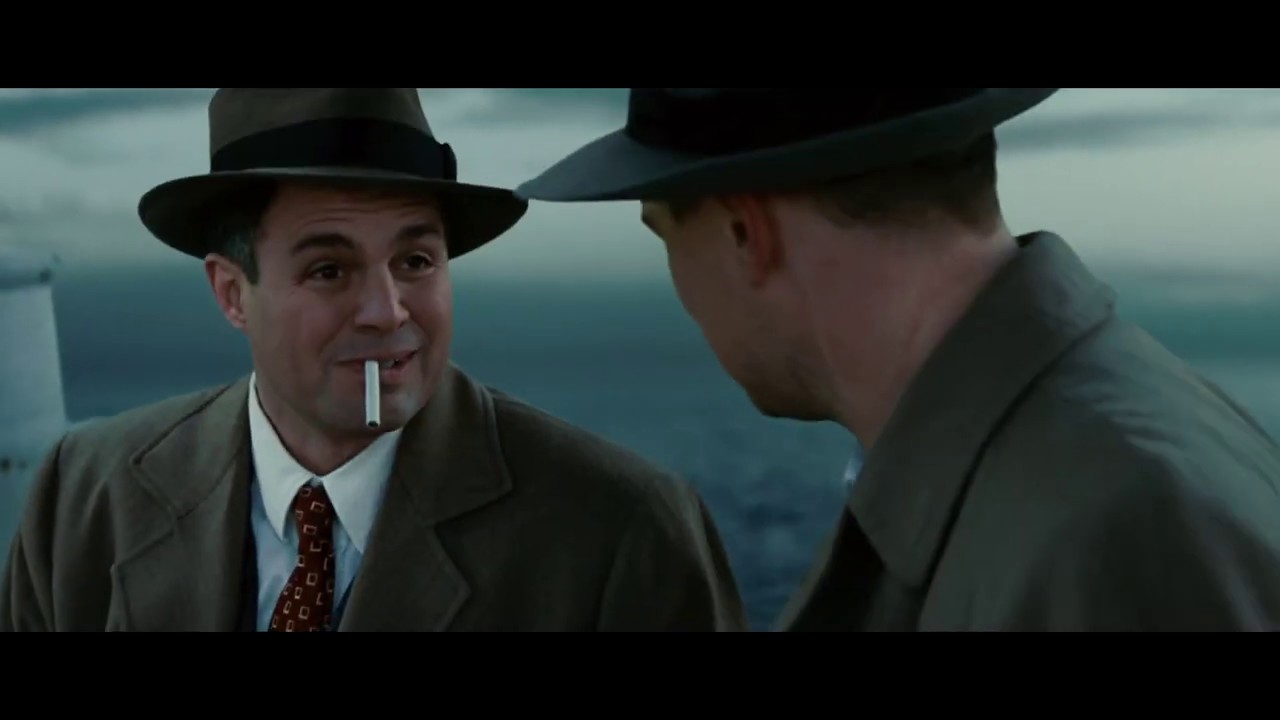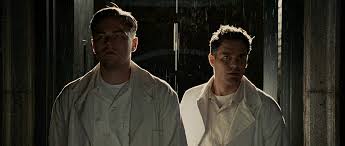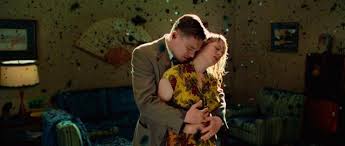Shutter Island (2010)

Shutter Island (2010) – A Deep Dive into Martin Scorsese’s Psychological Masterpiece
Introduction Released in 2010, Shutter Island is a psychological thriller directed by Martin Scorsese and starring Leonardo DiCaprio, Mark Ruffalo, Ben Kingsley, and Michelle Williams. Based on Dennis Lehane’s novel of the same name, the film takes viewers on a haunting journey through the mind of U.S. Marshal Teddy Daniels as he investigates a mysterious disappearance at a mental institution. The film masterfully blends psychological horror, noir elements, and intense drama to create an unforgettable cinematic experience.
Plot Summary The story is set in 1954 and follows U.S. Marshal Teddy Daniels (Leonardo DiCaprio) and his partner Chuck Aule (Mark Ruffalo) as they travel to Ashecliffe Hospital, a high-security psychiatric facility located on the remote Shutter Island. They are investigating the disappearance of Rachel Solando, a patient who seemingly vanished from her locked cell without a trace. As Teddy delves deeper into the case, he begins to suspect that the hospital staff, led by Dr. John Cawley (Ben Kingsley), is hiding something sinister.
As Teddy and Chuck continue their investigation, Teddy reveals his personal connection to the island. He suspects that the institution is conducting unethical experiments on patients, a theory fueled by his own traumatic past—having witnessed the horrors of World War II and lost his wife Dolores (Michelle Williams) in a tragic fire set by an arsonist named Andrew Laeddis. As the storm surrounding Shutter Island intensifies, Teddy begins to experience disturbing hallucinations and paranoia, leading him to question his own sanity.
The climax of the film presents an earth-shattering revelation: Teddy Daniels is actually Andrew Laeddis, a patient at the facility who has been suffering from severe delusions. The entire investigation was an elaborate role-play orchestrated by Dr. Cawley to help Andrew accept reality and break free from his constructed fantasy. Despite a brief moment of clarity, Andrew ultimately reverts to his delusions, leaving viewers with an ambiguous ending that raises profound psychological and philosophical questions.
Themes and Symbolism One of Shutter Island’s greatest strengths is its intricate exploration of psychological trauma, memory, and identity. The film challenges viewers to question reality, blurring the lines between truth and illusion.
- The Unreliability of Memory: Teddy’s journey illustrates how memory can be manipulated as a defense mechanism. His mind constructs an elaborate narrative to avoid facing the unbearable truth of his past.
- Mental Illness and Guilt: The film provides a harrowing depiction of grief and trauma, portraying how the mind can create an alternate reality to escape deep emotional wounds. Andrew’s struggle mirrors the psychological phenomenon of dissociation, where individuals fabricate illusions to protect themselves from painful truths.
- Government Conspiracies and 1950s Paranoia: The Cold War era backdrop enhances the film’s atmosphere of paranoia, with Teddy’s suspicions of government experiments reflecting real-life fears prevalent during that time.
- The Lighthouse as a Symbol: The lighthouse represents both the search for truth and the place where reality is ultimately confronted. It serves as a metaphor for the final step in Andrew’s journey toward self-awareness.
Cinematic Techniques and Direction Martin Scorsese employs a range of masterful cinematic techniques to create an atmosphere of unease and suspense.
- Cinematography: Robert Richardson’s cinematography plays a crucial role in establishing the film’s unsettling tone. The use of shadows, distorted perspectives, and dreamlike sequences reinforces the sense of psychological disorientation.
- Music and Sound Design: The film’s score, composed by Robbie Robertson, features a mix of eerie, melancholic classical pieces that heighten the sense of foreboding. The strategic use of silence in key scenes amplifies tension.
- Editing and Pacing: The non-linear storytelling, combined with abrupt flashbacks and hallucinations, keeps the audience engaged while mirroring Andrew’s fractured state of mind.

Leonardo DiCaprio’s Performance Leonardo DiCaprio delivers one of his most compelling performances as Teddy Daniels/Andrew Laeddis. His portrayal of a man on the brink of insanity is both heartbreaking and mesmerizing. DiCaprio masterfully conveys paranoia, grief, and vulnerability, making his character’s journey all the more impactful. His nuanced expressions, particularly in the final scenes, leave audiences pondering the true meaning of the film’s conclusion.
The Ending Explained: Reality or Delusion? One of the most discussed aspects of Shutter Island is its ambiguous ending. After the revelation that Teddy is actually Andrew Laeddis, he seems to briefly acknowledge the truth. However, in the final scene, he reverts to calling his doctor “Chuck” and asks, “Which would be worse: to live as a monster, or to die as a good man?” This line suggests that Andrew may have chosen to feign ignorance so that he can be lobotomized, effectively erasing his painful memories forever.
This interpretation presents an ethical dilemma—whether it is better to live in self-imposed ignorance or face a painful reality. The open-ended nature of the conclusion leaves room for speculation, adding to the film’s lasting impact.
Legacy and Impact Shutter Island remains one of the most thought-provoking psychological thrillers of the 21st century. It has garnered a cult following, with fans dissecting its hidden details and alternate interpretations. The film’s meticulous storytelling, combined with stellar performances and haunting cinematography, ensures its place as a modern classic.
Scorsese’s ability to craft an atmosphere of dread and uncertainty showcases his versatility as a director. While he is best known for crime dramas like Goodfellas and The Departed, Shutter Island proves his mastery extends into the realm of psychological horror.
Conclusion Shutter Island is a cinematic masterpiece that challenges the audience’s perception of reality. With a gripping narrative, breathtaking cinematography, and outstanding performances—particularly from Leonardo DiCaprio—the film is a must-watch for fans of psychological thrillers. Its themes of trauma, guilt, and the fragility of the human mind make it a deeply unsettling yet profoundly moving experience.
Whether you view it as a tragic character study or a mind-bending thriller, Shutter Island leaves an indelible mark on its viewers, inviting them to revisit its intricate layers time and time again. In the end, the question remains: would you rather live in painful truth or comforting delusion?
